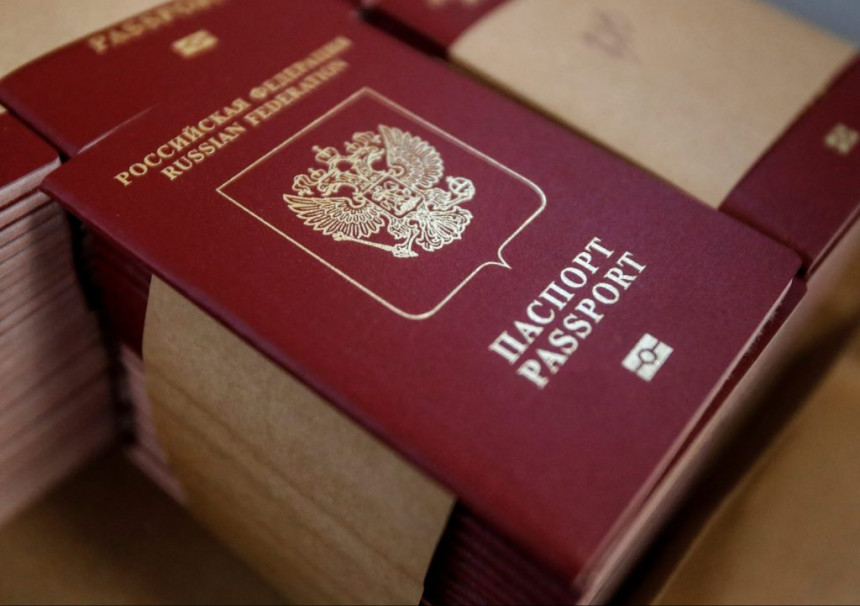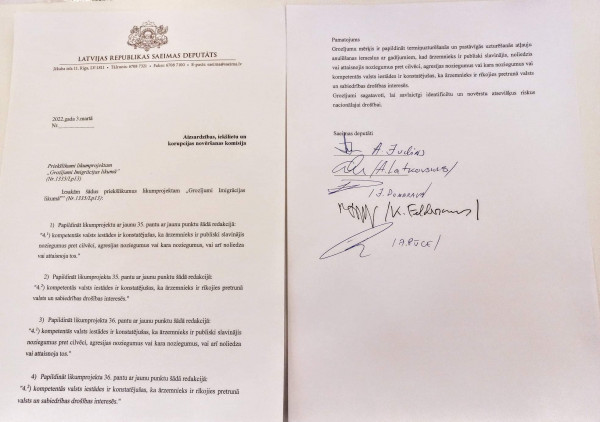Foreigners who deny Russian aggression in Ukraine might be expelled

Although the hasty amendments to the immigration law prepared by the National Alliance (Nacionālā apvienība), which were exclusively aimed at Russian citizens denying Russian aggression in Ukraine, were not referred to the committees, a new draft law was drafted during the Saeima session on Thursday. It retains the substance of the original draft law, but has been stripped of casuistry, and is now supported by all coalition parties.
Aware that among Russian citizens living in Latvia there are those who glorify Russian aggression in Ukraine, the politicians of the National Alliance had created amendments to the immigration law that targeted Russian citizens exclusively. One article of the draft law provided for the suspension of all types of residence permits for nationals of the neighboring country, while another stipulated that "all residence permits issued to citizens of the Russian Federation shall be revoked after three months" from the date of entry into force of the amendments.
The National Alliance had also provided for exceptions, in which a Russian citizen could nevertheless remain in Latvia after the three-month period had expired. For example, if the residence permit was issued for the purpose of education at an accredited Latvian educational institution. There would also have been exceptions if the person is an official of a specific type of company, registered in the commercial register, for whom a temporary residence permit has been issued for a term of office not exceeding five years, and other exceptions.
However, such a draft law was not acceptable to part of the public and to the coalition partners of the National Alliance, because such a reaction would also affect Russian citizens living in Latvia who oppose the policies pursued by Russian President Vladimir Putin. The National Alliance was also accused of resorting once again, in an election year, to using the old slogan "the Russians are coming", which in the current circumstances is dividing our society even more.

The National Alliance seemed to be aware of the possible consequences of the hastily drafted bill, and before the vote on referral to committees, Jānis Dombrava withdrew it. "Colleagues, this is not a question of a chance to earn rating points. Without unnecessary emotions, I want us all together to solve a major problem for national security. So that we can all be like-minded about the best solution (..) That is why I withdraw my signature from this draft law. I call on representatives of all parties to sit down at the same table as soon as possible, discuss this issue, come up with a version that we can all agree on, and together resubmit it to the Saeima for consideration," said Dombrava.
Since the Russian invasion of Ukraine, coalition politicians have indeed sat down together at the same table and produced a text that seemed acceptable to the leaders of the parliamentary factions of all coalition parties.
The new draft law got rid of the casuistic provision which was aimed only at Russian citizens. According to the new wording,
a residence permit or a temporary residence permit will be revoked and a third-country national expelled from Latvia if the competent state authorities have established that the foreigner has publicly glorified, denied or justified crimes against humanity, crimes of aggression or war crimes.
Dombrava acknowledges that the draft law still has to withstand criticism from the responsible committee, but given that the document has been signed by all the leaders of the coalition parties' parliamentary factions and Andrejs Judins, representing New Unity (Jaunā vienotība), it is very likely that the draft law will be approved by the Saeima quickly.
The diplomatic justification for the amendments to the Immigration Law by the signatories is that they will help to identify and address certain risks to national security in a timely manner.
However, the true motivation for the draft law is made much clearer by the annotation of the withdrawn draft law: "Taking into account (..) that a relatively large number of citizens of the Russian Federation are in the Republic of Latvia on the basis of visas or residence permits, as well as the fact that there is a possibility that these Russian nationals actively support Russian activities, thus potentially creating a risk to the national security of the Latvian state, we propose to amend the Immigration Law by indefinitely revoking all residence permits issued."